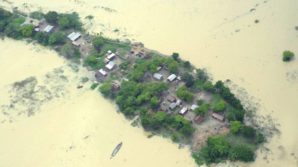 The incidents of water-logging in Dhaka, other cities and rural areas have been worsening every monsoon due to the fact that effective prevention measures are not undertaken or executed properly by the designated authorities. What we see is restorative activities take place to drain the water out and distribution of relief and medicines – which still is often inadequate to tackle the loss derived from stranded water. The woes of the rural people is much higher than the city people who experience this menace for several hours while the river-bank people have to bear the brunt for days, and even months.
The incidents of water-logging in Dhaka, other cities and rural areas have been worsening every monsoon due to the fact that effective prevention measures are not undertaken or executed properly by the designated authorities. What we see is restorative activities take place to drain the water out and distribution of relief and medicines – which still is often inadequate to tackle the loss derived from stranded water. The woes of the rural people is much higher than the city people who experience this menace for several hours while the river-bank people have to bear the brunt for days, and even months.
With the persistent sufferings, people now consider themselves as victims of natural calamity as they do not see an end during the successive governments till 2013. Even though the issue hits the headlines and the authorities concerned repeatedly admit their inability to tackle it and pledge better action and preparedness, we don’t see sincerity in the government officials to draw an end to the massive hindrance of public life by carrying out effective long-, medium- or short-term measures.
In cities, we see the people coming out of home and drive into knee- and sometimes chest-height water to continue their daily work – going to office, schools, shopping and other emergency tasks outside home. They find minimum transport at that time while hundreds of vehicles stuck on the streets – full of potholes and open manholes. Accidents take place rampant.
Moreover, water-logging has a serious impact on public health as rain water mixes with dumped waste, toxins of the drains and even weak sewerage systems. In many areas, water supply connections are contaminated and people have to go far to collect drinking water. People often face common skin diseases, malaria and water-borne diseases.
It should be mentioned that people in the rural areas have quite taken it for granted that they’d have to face water-logging and marooned for living close to rivers and coastal areas when there’re flash floods and tidal surge. Had there be any master plan to tackle these common natural disasters, loss could also reduced significantly by carrying out regular maintenance of the embankments and dredging of the rivers, and by alerting people of the vulnerable areas beforehand to evacuate to a safer place and save their valuables. Such alerts could save many lives, mainly of women, children and elderly, and also the crops worth millions which go marooned in floods.
But what we see in reality is very shocking! Floods have become so frequent that the government and the media do not give it an importance anymore unless the casualties reach hundred plus. Though millions of people are hit by the floods and most of them remain marooned for days.
Water-logging is caused by heavy rains in the monsoon mainly due to the blockages created in drains, storm water tunnels and canals in the cities with severe waste dumping, lack of regular maintenance and land filling. The city corporation, Wasa, housing and public works, Department of Environment, Ministry of Water Resources, LGRD and the law enforcers all have some shared responsibilities to maintain these issues round the year to avert public woes. And in the case of rural areas, supervision and maintenance of the embankments and alerting the locals can prevent water-logging which just paralyses livelihood.
But are the people of urban and rural areas actually too vulnerable to these natural calamities? Isn’t it possible to make an end to the problem we’ve been facing for decades?
Rains or floods can’t be termed “devastating” or “unexpected” like earthquake as those regular weather impacts can be forecasted with the mechanism we’ve already in place. We lack sincerity in the authorities responsible in taking up proper measures and executing them effectively without any irregularities and corruption. Following a long-term plan can help execute the regular preparatory activities in an effective manner – so that the measures really work.
Initiating development activities in the dry season is a major step the government has to take breaking the age-old malpractice. There’s no alternative to “coordination” among the related agencies and individuals in planning and execution of the “comprehensive” work plans to protect the people of the country. We need to ensure a sustainable society where the citizens would not be “devastated” by natural disasters due to a handful of brutal and greedy officials’ lack of affection for mankind.
The writer is a senior staff sub-editor at Dhaka Tribune. He can be reached at probir.sarker@dhakatribune.com

